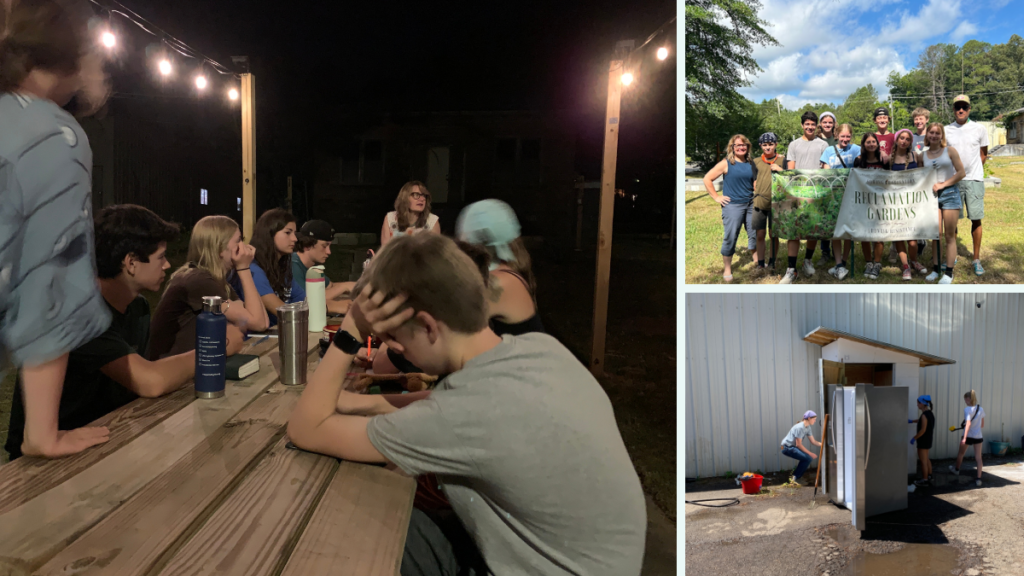A Reflection on the 2024 Youth mission Trip

On our second night in Parrish, after a full day of hard work followed by excellent southern barbecue at the Full Moon, we sat out in the garden under the lights (with plenty of bug spray for all…see above) and considered what is holy. What does it mean that something is “holy”? When you aren’t a church person, or you aren’t sure how to define it even if you are, it helps to start by considering three things in your life:
What is good? What is beautiful? What is true?
Because you were not on the trip, I wonder if you have time to do this, right now. Let’s try it:
What, in your life right now, is GOOD? How do you know goodness?
Go ahead, right down whatever comes to mind first. I’ll wait.
Okay good. Now. What, in your life right now, is BEAUTIFUL?
How do you experience beauty?
Take your time on this one, my friend. It is our duty to notice and participate in beauty wherever we find it…it is one of the best ways to thank and co-create with the God who loves us and is so pleased that we have showed up and taken notice.
Excellent. Last thing. What, in your life right now, is TRUE?
How do you know what is true? What difference does it make?
It’s important not to get into right and wrong here, that is not what I am asking nor is it what I mean by “true”. Try to stay out of your head! Feel this one in your bones. Maybe don’t think at all, just feel.
What is coming forward? How do these reflections connect?
What stands up and has your attention now as “holy”?
We talked about our answers at length with each other and started to see and to feel and to know what is holy in our lives, what is holy already in Alabama. We found that for many of us, holiness is found in relationship: with the land, with each other, with our friends and family at home, with ourselves, with God. This was good news to me, I’ll tell you, because the work of change requires empathy, as I have previously written in the e-news from June 19th, but as our dear friend Helen Christianson always says, “we cannot do this life without God but we cannot do without each other” and she is right every time she says it. We need each other for the journey, don’t we? The work of change, the practice of faith, requires community and begs for real relationship as we go.
I am so pleased that these students connected holiness with relationship. As they engaged the work of changing the tides of scarcity to abundance, of isolation to community, of injustice to the right relationship, they got a small sense that this kind of work is hard over a lifetime. You get tired. You get dispirited. You want to just curl up with a bag of Cheetos and watch TV and not care about it because, if you are doing it well, it will hurt your heart sometimes. Just ask Ryan and his wife Jordan. They know.
In his very famous reply to a friend who felt frustrated with our government during the days of the Vietnam War and the battle for Civil Rights, the Trappist monk Thomas Merton wrote this:
Do not depend on the hope of results.
When you are doing the sort of work you have taken on, essentially an apostolic work,
you may have to face the fact that your work will be apparently worthless
and even achieve no result at all, if not perhaps results opposite to what you expect.
As you get used to this idea you start more and more to concentrate not on the results
but on the value, the rightness, the truth of the work itself.
And there too a great deal has to be gone through,
as gradually you struggle less and less for an idea and more and more for specific people. The range tends to narrow down, but it gets much more real.
In the end, it is the reality of personal relationships that saves everything.
I know this bit by heart. I have recited it often since my days as a full time social justice hopeful 22 year old, living in a community in West Philadelphia and teaching religion and creative writing to first, second and third graders back in 1993-94. It sums up incarnational theology quite nicely, recognizing that God chose to be in an intimate relationship with us as a baby who then became a man, and lived among us and showed us what a radical love can be in the world.
Words, slogans and theories are not nearly as important as how we see and relate to each other — the relationships we build — and not only with friends but with adversaries too, in whatever form they come. In the context of any work for a gospel love that does justice, it suggests getting to know, as best we can, the people and cultures being targeted by our weapons, being excluded by our economic policies and participation, being “othered” by our narrow ways of thinking about class, race, gender and gender identity, even location (the American South?). We belong to each other. The Body of Christ.
At the end of his very long reply to his young activist friend, Merton writes, “The real hope, then, is not in something we think we can do, but in God who is making something good out of it in some way we cannot see. If we can do His will, we will be helping in this process. But we will not necessarily know all about it beforehand…”.
These students all encountered hope in Parrish, Alabama, a holy place carved out in love and faith by the Cagle family, a family that strives to widen the circle of dignity and create a radical “WE” in a place that might otherwise be isolated and made small by poverty and neglect.
We are home now. We carry these lessons and this time in our hearts, in our relationships too. Thank you all for your generous support in prayer. I look forward to sharing a bit of this trip with you all on Sunday (I’m preaching this week and I’ll bring some stories and slides!) and again in August when students return to school and we begin another season of youth ministry on the 25th.
Full of the blessings of relationships and home,
Sarah Christopher
Associate Pastor

Recent Comments